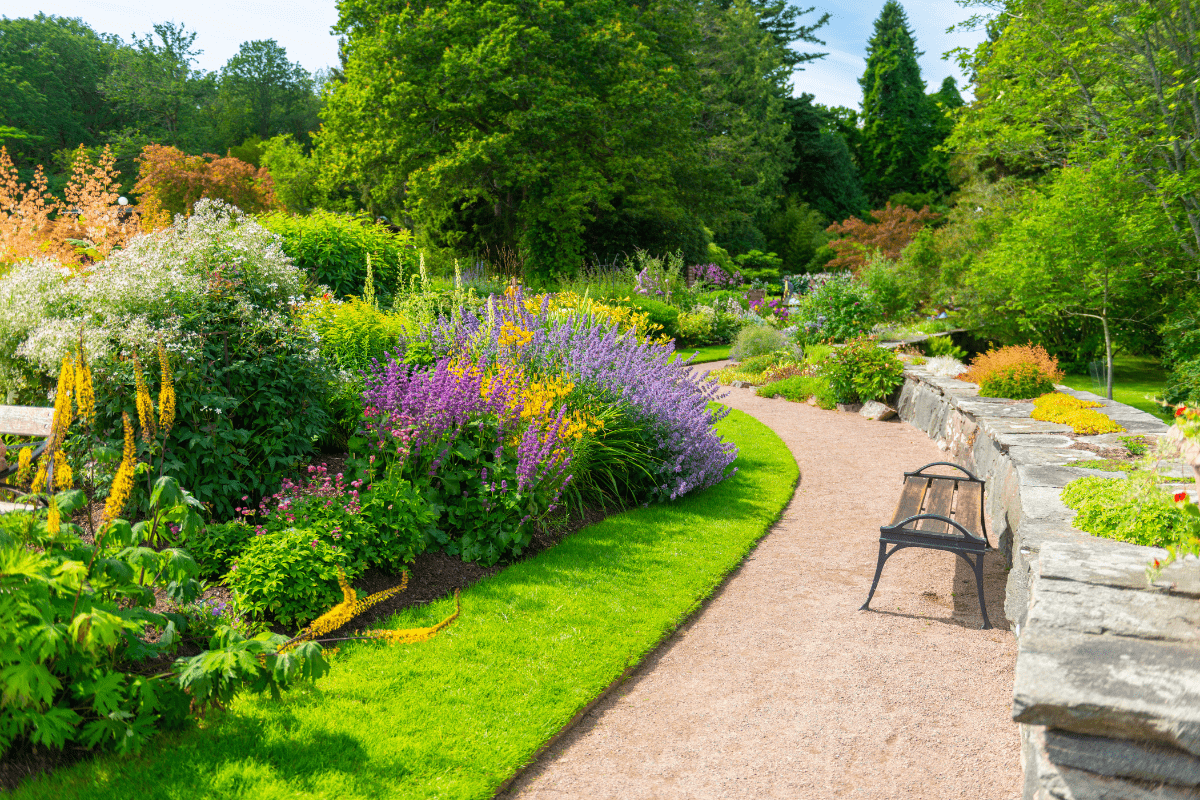Tennessee's botanical gardens offer way more than just pretty flowers and peaceful walking paths. From Memphis to Chattanooga, these living museums showcase over 10,000 plant species across dramatically different landscapes, welcoming more than 660,000 visitors annually who come for everything from Instagram-worthy Japanese gardens to serious horticultural research.
Memphis Botanic Garden: Where 96 Acres Meet 30 Different Worlds
The Memphis Botanic Garden proves that bigger really can be better when it comes to botanical experiences. Located at 750 Cherry Road in Audubon Park, this West Tennessee gem transforms 96 acres into 30 distinct specialty gardens that somehow manage to feel both grand and intimate at the same time.
Your wallet won't hate you for visiting either. Adults pay $12, seniors get in for $10, and kids are just $7. If you're rolling deep with 20 or more people, everyone saves $2 per ticket. The garden stays open from 9:00 AM to 6:00 PM during daylight saving time, then switches to 9:00 AM to 4:30 PM when winter arrives and we all question our life choices.
The Japanese Garden steals the show (and your Instagram feed)
The Japanese Garden of Tranquility features that iconic red drum bridge you've definitely seen in someone's profile picture. It's officially Memphis's most photographed garden feature, and once you see those koi gliding beneath the bridge while cherry blossoms frame the scene, you'll understand why everyone's phone storage mysteriously fills up here.
But wait, there's more (as they say in those commercials you skip). The herb garden isn't just some cute collection of basil and oregano. We're talking about one of the nation's largest herb displays with over 500 species. The My Big Backyard children's area spans 2.5 acres and includes water features that kids can actually play in without parents having a meltdown.
The newest addition, the Youth Education and Tropical Plant House, brings rainforest vibes to Tennessee year-round. Because sometimes you need to pretend you're in Costa Rica when it's 35 degrees outside.
Special events that actually feel special
Starting February 1, 2025, the garden hosts Thomas Dambo's TROLLS: Save the Humans exhibition. Six massive troll sculptures made from reclaimed materials will lurk throughout the grounds until May 21. It's like a treasure hunt, but instead of gold, you find giant woodland creatures judging your recycling habits.
The Live at the Garden concert series brings legitimate acts like Third Eye Blind, Parker McCollum, and Darius Rucker to the Radians Amphitheater. Nothing says "botanical experience" quite like singing "Semi-Charmed Life" surrounded by 75 varieties of roses.
Educational programs here reach 40,000 school children annually from 192 area schools. The garden holds Four-Star Charity Navigator status, plus TUFC Level 4 and ArbNet Level 2 Arboretum certifications, which sounds impressive even if you're not entirely sure what those mean.
Making gardens accessible to everyone
Family memberships start at $125 annually and include unlimited admission plus reciprocal access to 345 gardens nationwide. That's basically a garden passport for the price of a mediocre weekend getaway.
Here's something genuinely cool: Memphis residents with EBT cards qualify for free family memberships through the garden's accessibility program. Because beautiful spaces shouldn't be luxury items.
Most visitors spend 2-3 hours exploring, and parking is free at the Visitors Center. Pro tip: the Japanese Garden gets crowded on weekends, so hit it early if you want those serene reflection shots without random strangers photobombing your zen moment.
Cheekwood Estate: Nashville's Answer to "What If Gardens Had Trust Funds?"
Perched on 55 acres at 1200 Forrest Park Drive, Cheekwood feels like what would happen if Downton Abbey had a baby with the Brooklyn Botanic Garden. This 1929 Georgian mansion and its 13 distinct garden rooms welcome 400,000 visitors annually, making it Nashville's botanical superstar.
The place stays open Tuesday through Sunday from 9:00 AM to 5:00 PM, with extended hours during special events because Nashville doesn't really do "early to bed." Garden-only tickets run $22 for adults and $15 for youth. Want to explore the mansion too? That'll be $28 for adults and $21 for youth, plus a $5 parking fee unless you're a member.
A masterclass in botanical showing off
The Cornus Collection features 238 dogwood trees, creating the most comprehensive dogwood display in the southeastern United States. During peak bloom, it looks like nature's version of a foam party, but classier and with way better photography opportunities.
Numbers people will appreciate this: Cheekwood maintains 2,100 trees across 130 species, including 1,267 deciduous specimens and 576 evergreens. The Bradford Robertson Color Garden creates these sweeping curves of seasonal color that change more dramatically than Nashville's weather.
The Blevins Japanese Garden offers a meditative tea garden experience designed by renowned landscape architect David Harris Engel. It's the kind of place where you suddenly understand why people pay $8 for matcha lattes.
When art crashes the garden party
Here's where Cheekwood gets interesting. They've seamlessly integrated a 7,000-piece art collection throughout indoor galleries and outdoor installations. The Ann and Monroe Carell Jr. Family Sculpture Trail winds through 14 acres of native forest, proving that art doesn't always need white walls and weird lighting.
Spring brings Cheekwood in Bloom from March 8 to April 13, 2025, featuring 250,000 blooming bulbs. That's a quarter million reasons to visit, plus it's been named one of USA Today's Top 10 Botanical Gardens three times.
Summer exhibitions include Robert Indiana's iconic LOVE sculptures, because nothing says "romance" quite like taking selfies with giant letters while bees investigate your perfume.
Amenities that make sense
Café 29 in the Frist Learning Center serves actual food, not just overpriced salads that leave you hungry. Two gift shops peddle botanical and artistic merchandise for when you need to prove you're cultured.
Audio tours come in English and Spanish, and guided mansion tours happen at 12:45 PM on weekdays. The TOTS program in the Bracken Foundation Children's Garden keeps little ones engaged without resorting to screens.
Memberships start at $70 for individuals and include free admission, parking, and reciprocal benefits at over 100 gardens and museums. Basically, it pays for itself if you visit more than twice and want to park your car legally.
UT Gardens: Where "Free Admission" Isn't a Typo
Designated as Tennessee's official State Botanical Garden in 2013, the University of Tennessee Gardens system proves that the best things in life actually can be free. With locations in Knoxville, Jackson, and Crossville, they evaluate 4,000 plant varieties annually while charging exactly zero dollars for admission.
Knoxville location brings the roses
Located at 2518 Jacob Drive, the Knoxville garden opens daily from sunrise to sunset, which is garden-speak for "whenever you want." The Beall Family Rose Garden showcases 120 rose bushes, making it East Tennessee's largest public rose display and the reason your allergies act up every May.
The children's discovery garden provides hands-on learning without the "don't touch anything" rules that make kids hate museums. Extensive perennial trials help determine which plants will thrive in your yard versus which ones will dramatically die despite your best efforts.
One minor hiccup: parking is limited to 10 designated visitor spaces on weekdays. It's like they're testing your commitment to horticulture through parking adversity.
Jackson location embraces the heat
The Jackson campus on Airways Boulevard specializes in plants that laugh at West Tennessee's summer heat. Their collections include:
- Heat-tolerant hydrangeas and magnolias
- American Conifer Society designated conifers
- 75 daylily cultivars (for endless variety)
- Acidic-peat bog with carnivorous plants
- Xerophyte beds featuring drought-resistant champions
The unique bog garden cultivates pitcher plants, sundews, and Venus flytraps, proving that even plants can be metal. Their Spring Plant Sale on May 2-3, 2025, lets you take home plants that have already survived West Tennessee's climate mood swings.
Crossville tackles the Cumberland Plateau
The Crossville location addresses the unique growing conditions of the Cumberland Plateau, which is basically Tennessee's way of saying "good luck growing anything normal here." Demonstration gardens developed with Cumberland County Master Gardeners show what actually works at elevation.
Educational classes throughout the growing season teach you how to garden when your climate can't decide if it wants to be North Carolina or Kentucky.
East Tennessee's Wild Side: Nature Does the Heavy Lifting
Reflection Riding: 317 acres of "leave it better than you found it"
Chattanooga's Reflection Riding Arboretum and Nature Center takes a different approach. Instead of manicured gardens, they've preserved 317 acres along Lookout Creek as nature intended, just with better trails and helpful signs.
Members enjoy sunrise to sunset access, while the public Welcome Center opens Tuesday through Saturday from 9:00 AM to 4:00 PM. The donation-based admission model means you pay what you can, making this one of the most financially accessible options in Tennessee.
Over 1,000 native plant species thrive across five distinct biomes, with 140 identified tree species creating the Southeast's most comprehensive native plant display. They're also running an endangered red wolf breeding program, because apparently saving plants wasn't ambitious enough.
The trail system offers something for everyone:
- 15 miles connecting to Lookout Mountain trails
- 3-mile gravel loop for walking/running/cycling
- Seasonal canoe rentals for water-level views
- Wildlife viewing opportunities (resident bobcats!)
The native plant nursery operates Thursday through Saturday during growing season, selling plants that actually belong in Tennessee instead of whatever trendy tropical your neighbor keeps killing.
Knoxville Botanical Garden: History meets horticulture (for free)
The Knoxville Botanical Garden at 2743 Wimpole Avenue opens dawn to dusk daily and charges absolutely nothing for admission. Listed on the National Register of Historic Places, this 44-acre property showcases over 200 years of Tennessee horticulture with stone walls dating to the 1780s.
The Secret Garden, inspired by Frances Hodgson Burnett's novel, creates an enchanted atmosphere within historic Howell Nurseries structures. Seventeen display gardens include the Paulk Peony Garden and various dogwood collections, while elevated positions offer Smoky Mountain views that make you forget you're in the middle of a city.
Fair warning: recent reviews mention maintenance challenges. Think of it as "rustic charm" rather than "neglect" and you'll have a better time.
Timing Your Visit: When Gardens Peak and Tourists Don't
Spring dominates Tennessee's garden calendar, but knowing exactly when to visit makes the difference between fighting crowds for tulip photos and having entire garden sections to yourself.
Spring spectacular schedule
Memphis Botanic Garden's progression goes like this: daffodils and cherry blossoms peak in early to mid-March, followed by azaleas and dogwoods in early April, then tulips and irises by mid-April. It's basically nature's version of a choreographed dance routine.
Cheekwood's massive tulip display hits peak Instagram-worthiness between late March and early April, which also means peak crowds. UT Gardens' rose collections achieve maximum romance in late May through June.
Fall and winter surprises
October brings spectacular foliage to mountain-region gardens like Reflection Riding, with ideal weather and autumn colors that make you understand why people write poetry.
Holiday light displays transform multiple gardens from late November through early January. Cheekwood's 750,000-light installation and Memphis's Holiday Wonders create magical winter experiences that almost make you forget how cold your face is.
Picture Perfect: Photography Tips That Don't Involve Filters
Instagram hot spots that deliver
Cheekwood's Wisteria Arbor creates those cascading bloom shots that make your friends think you've hired a professional photographer. The Martin Boxwood Gardens offer a "storybook entrance" that frames portraits perfectly year-round, no seasonal timing required.
Memphis Botanic Garden's Japanese Garden koi pond reflections work magic, especially during cherry blossom season when pink petals float on the water like nature's confetti.
Photography policies that make sense
Personal photography is welcome everywhere, so snap away. Professional shoots require advance booking:
- Memphis charges $25
- Cheekwood has variable rates
- Other locations vary (call ahead)
The good news: unlike some venues that treat cameras like weapons, Tennessee's gardens understand that people like taking pictures of beautiful things.
Budget-Friendly Strategies for Garden Enthusiasts
Completely free options
Start with these zero-admission gardens:
- All three UT Gardens locations
- Knoxville Botanical Garden & Arboretum
- Dixon Gallery & Gardens (17 acres, permanently free!)
Membership math that works
Memphis's $125 family membership pays for itself in just 5 visits. Most memberships include reciprocal admission to 300+ other gardens nationally, turning you into a garden-hopping nomad if that's your thing.
Group discounts typically kick in at 20+ people, perfect for garden clubs, class trips, or just recruiting enough friends to save $2 each.
Practical Planning: The Stuff Nobody Tells You
Time and logistics reality check
Plan on 2-3 hours for standard visits, though enthusiasts easily spend half-days at larger properties. The Memphis-to-Nashville garden route covers 200 miles of scenic driving, making it perfect for an ambitious garden-crawling weekend.
Essential preparations nobody mentions
Bring water bottles because some locations have limited refill stations and garden walking is surprisingly dehydrating. Wear shoes you can actually walk miles in… those cute sandals will betray you by hour two.
Download garden maps before arriving since cellular service varies wildly. Some gardens seem to exist in technological dead zones where your phone becomes an expensive camera.
Summer visits demand early morning arrival unless you enjoy feeling like a wilted flower yourself. Temperatures regularly exceed 90°F by noon, and humidity makes it feel like you're touring gardens inside a greenhouse.
Accessibility varies wildly
Memphis Botanic Garden offers free push-wheelchairs and dedicated accessible parking, setting the gold standard. Historic sites like Knoxville Botanical Garden present challenging terrain that makes mobility devices struggle.
Most major gardens have paved paths, but calling ahead for specific accessibility needs saves disappointment. Gardens want everyone to enjoy their spaces, but some are better equipped than others.
Your Tennessee Garden Adventure Awaits
Tennessee's botanical gardens collectively preserve horticultural heritage while advancing plant science and creating spaces where people actually want to spend time. Memphis brings nationally recognized herb collections and family-friendly features. Nashville seamlessly blends art with horticulture in ways that feel natural rather than forced. Chattanooga champions native plant conservation with trails that make you forget you're learning. The UT system provides free education disguised as beautiful gardens.
Whether you're a serious plant nerd seeking rare specimens, a parent desperate for somewhere educational kids actually enjoy, or someone who just likes pretty flowers and peaceful walks, Tennessee's botanical institutions deliver. Each season offers completely different experiences, from spring's explosive blooms to winter's twinkling lights, ensuring these living museums never get old.
Pack comfortable shoes, charge your camera, and prepare to discover why Tennessee's botanical gardens attract over half a million visitors annually. They're not just pretty spaces… they're reminders that sometimes the best things really do grow in Tennessee.





